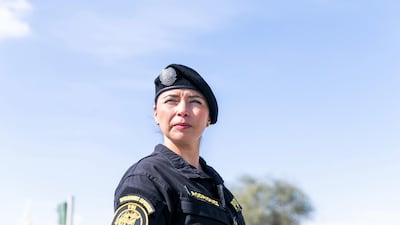Elite international police told of taking on mobsters, drug cartels and kidnappers as they competed in the UAE Swat Challenge.
From the favelas of Sao Paulo to the Mafia-run streets of Sicily, highly trained armed officers are on the front lines of the war against organised crime.
Dozens took part in a competition to test their fitness and skills in Dubai this week.
The Emirati desert was a long way from the notorious San Joaquin neighbourhood of the Chilean capital Santiago for Inspector Paula Rodriguez.
The sole woman in the challenge this week, she serves with Chile's Metropolitan Tactical Reaction Brigade.
The 33-year-old, one of only three women in the brigade, told of a recent raid to arrest drug trade suspects in San Joaquin.
“We call it a red zone in reference to how dangerous the area is," she said.
"Officers were shot at the moment they were spotted."
The team found themselves crouching behind armoured vehicles as bullets flew around them.
“While gang members were shooting to kill, the team and I were shooting for our own protection,” she said.
Most recently she was involved in a raid to arrest 23 Colombian drug traffickers in the Chilean capital, who were wanted for kidnapping a rival gang member, among other offences.
“We are always last to leave, to ensure the mission has been accomplished and people have been secured," she said.
Andrade Silva, 50, who has served in Brazilian internal security forces for 15 years, told of the ruthlessness of gangs in Sao Paulo, home to more than 12 million people.
“The greatest danger we face is the criminal gangs that carry out brazen attacks against the police,” said Mr Silva, a broad, shaven-headed man with a white beard and arms covered in tattoos.
Shootouts are common. Brazilian police kill on average five suspects every day. They often lose their own officers.
Three weeks before flying to Dubai, Mr Silva was tasked with arresting a police killer in the favelas - sprawling shanty towns often run by drug gangs.
“It wasn’t a hassle-free mission. We jumped on top of tin-home roofs and we were shot at by heavily armed criminals,” he said.
The suspect was shot dead during an exchange of fire between officers and gang members. Another was arrested.
“Having killed my friend, I felt happy he was dead,” said Mr Silva.
Another mission saw Mr Silva and his boss, Alexandre Martins, 49, rescue a five-year-old girl kidnapped for ransom.
“She was with her mother when she was snatched, then kept in a shack in one of São Paulo’s dangerous neighbourhoods that we call favelas,” said Mr Martins, chief of investigations.
Calls between kidnappers and the girl’s family were monitored to help officers to trace them.
“The family was going to pay ransom but we made sure to do the right thing,” he said.
When she was found in the favela, Mr Silva was first to enter the room where she was held.
“She didn’t know who I was, but ran towards me and jumped into my lap. It was a rewarding feeling to free and unite her with her family,” he said.
Mr Martins said in Sao Paulo alone, police deal with about 2,000 kidnap cases a year. Some for ransom and others are acts of revenge between rival drug cartels.
“The risk of losing one’s life is present in every mission, but it's worth it when it's about saving lives,” he said.
For the special police units of Italy, their perpetual enemy is the 'Ndrangheta - considered to be among the world's wealthiest crime organisations.
Paolo Dalla Pozza grew up in an Italy in which corruption was everywhere.
“As a child I found it unfair Mafia could get away with everything they did,” he said.
It spurred him to join Italy's elite Reggimento Carabinieri Paracadutisti or Carabinieri Paratroopers Regiment, based in Livorno, Tuscany.
He has been deployed 19 times to Afghanistan, Iraq and Libya, serving on anti-terrorism task forces and guarding diplomats in high risk areas.
But his career highlight to date is closer to home - dismantling a major crime family within the 'Ndrangheta.
“Last month I was part of a 24-member team that arrested 365 mafia members, after a judge gave us the order," he said.
“But an operation this size meant numerous policemen worked undercover for years and risked their lives to track down these people, so we can't take all the credit."

All of the Swat operators reiterate the same point - they are ordinary people working in extraordinary circumstances.
“We are not superhuman, we have fear in times of danger, but we put them aside to be able to act, it's the only way to survive the mission," he said.
"Later, we have plenty of time to address our fears."
Forty-six teams from 26 countries competed between February 9 and 13 to win a total of $170,000, including a $10,000 daily prize for the top three teams in this year’s UAE Swat Challenge.













